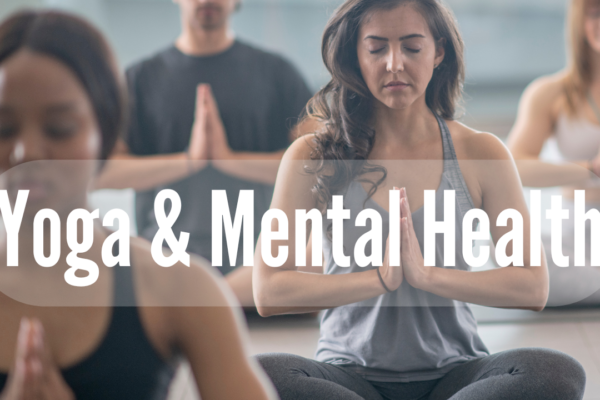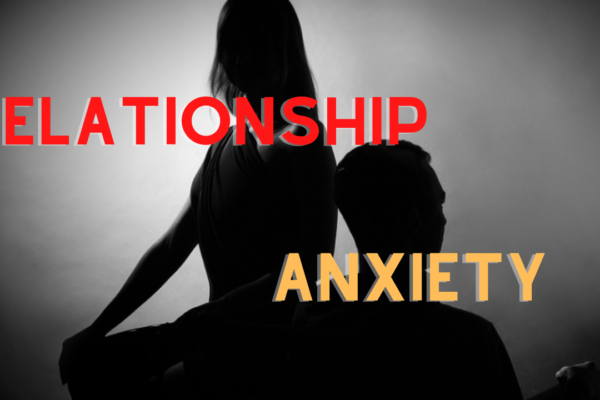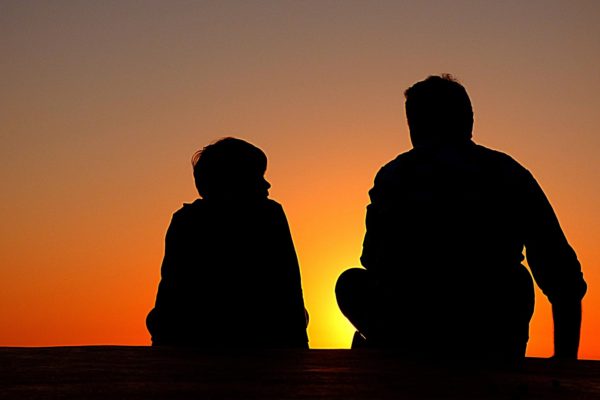Are you or someone you know struggling with social anxiety? Then stick around because in this episode of the mental health Toolbox, we’re talking about the difference between social anxiety disorder vs shyness, and when to seek help.
It can be difficult to distinguish the difference between social anxiety and shyness, so let’s break down the difference.
Table of Contents
DISCLAIMER: Just a reminder that this content is not medical advice nor a treatment plan. It is intended for entertainment and general education purposes only and should not be used as a means to self-diagnose or self-treat any health, medical or physical condition, if you need a professional, you should get one.
So let’s start off by talking about what social anxiety is.
Social anxiety disorder includes fear, anxiety and avoidance that interfere with relationships, daily routines, work, school or other activities. Social anxiety disorder typically begins in the early to mid-teens, though it can sometimes start in younger children or adults.
Mayo Clinic
So the important thing here is to take note of the fact that social anxiety, if we’re looking at it as a disorder, interferes with your life.
It’s not something that is just inconvenient, or that causes you to drag your feet a little bit.
It is something that causes disruption, or an arrested kind of development in your life stages.
Social anxiety is also sometimes referred to as social phobia, which sounds a little more to the point, right?
And that’s because it is literally a fear, an intense fear of social engagement.
And we’re going to talk a little more about that and why that’s the case.
When we’re talking about social anxiety as a disorder, it’s important to remember that this is more than just a panic disorder.
There are a lot of different types of anxiety.
There’s generalized anxiety.
There’s agoraphobia.
There’s agoraphobia with panic attacks
There’s panic disorder.
There’s social anxiety.
And then there’s some ancillary, other types, of anxiety disorders, that we’re not going to dive into right now, but when you think about social anxiety, I want you to think about anticipatory anxiety.
It Is this incredible discomfort that comes with anticipating a social engagement interaction context usually wherein the person fears being judged.
There’s usually a lot of fear that encompasses it and how they’re going to be perceived by their peers, or even that their anxiety will be obvious to others.
It’s this vicious feedback loop right when distinguishing the difference between a social anxiety disorder or shyness.
It’s important that we really look at the criteria so that we don’t pathologize something that is just part of a personality or context, right?
We want to make sure that we’re if we’re going to label something as an impairment or very clear about what makes it an impairment.
The criteria, and what helps us do that are manuals like the DSM 5, which is the most recent at the time of this posting.
With the help of the diagnostic statistical manual for mental disorders, we’re just going to walk through a few of the criteria that outlines what to consider in a diagnosis.
Now that being said, just because you can check these boxes does not make it a diagnosis; that needs to come from a professional, a mental health clinician that you’re working closely with. This is just some general guidance in terms of trying to use that discernment to ask yourself, “should I seek help for this, or is this just a life phase that I’m working through?”
So let’s take a look at that for a second.
Social Anxiety
So the DSM lists several criteria that must be met.
In order to even consider a diagnosis, the first of which is” a marked fear or anxiety about one or more social situations in which the individual is exposed to possible scrutiny by others.”
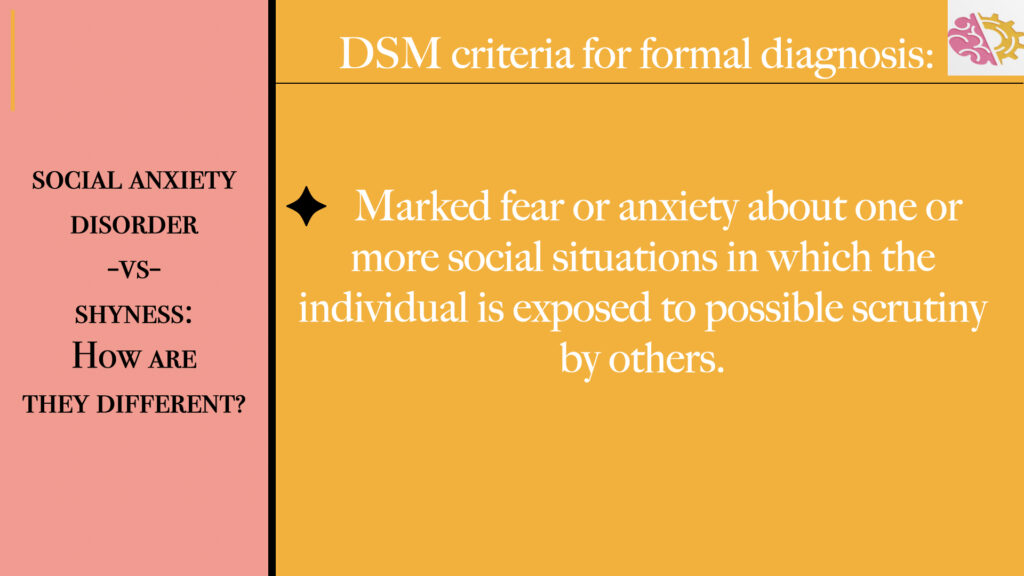
So again, that emphasizes the anticipatory anxiety of being judged by ones’ peers, or authorities, depending on the age, and could be a child to a parent, or could be a teen or adult to a peer.
There are many different context to consider here.
The second criteria states that the social “situations almost always provoke fear or anxiety.”
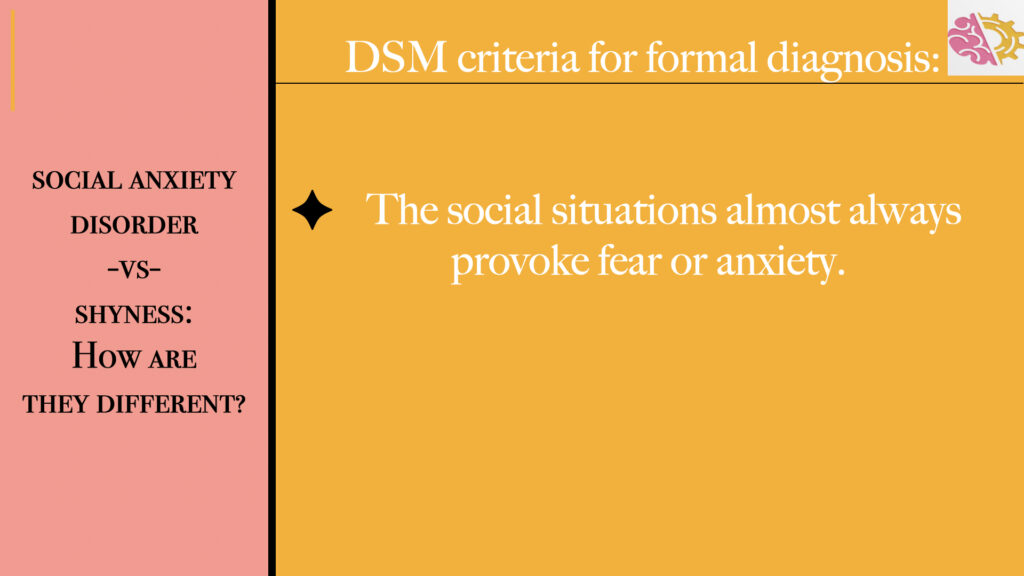
Now, this isn’t just sometimes this isn’t just at birthday parties or at particular events; this is almost all social engagements provoke anxiety or fear.
The third criteria states that “fear, worry, or anxiety, is out of proportion to the actual threat posed by the social situation and to the social cultural context.
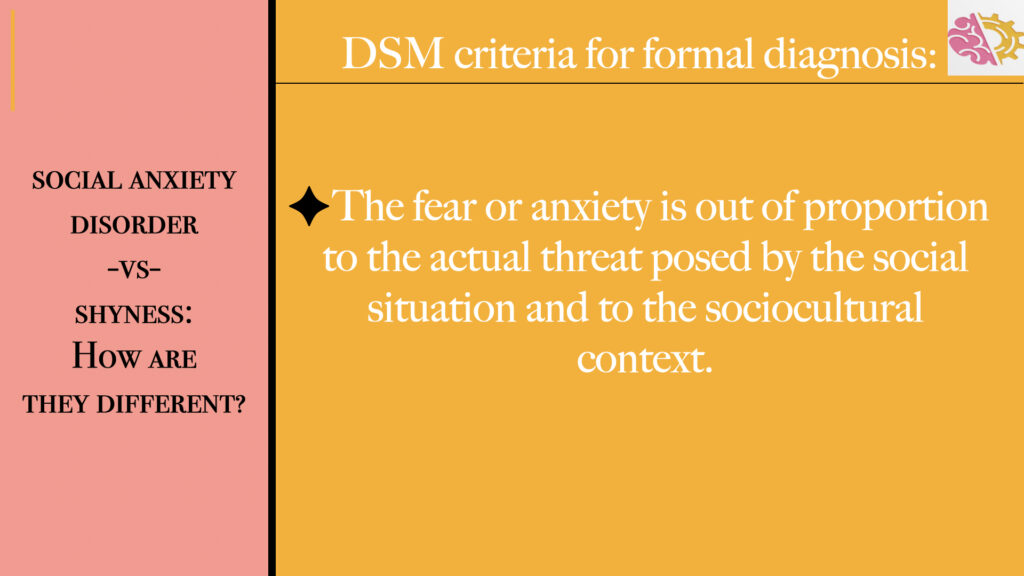
So what this is saying is that it’s irrational.
It’s taking something that might be stressful under normal circumstance, and taking it to the extreme. it’s jumping out of proportion to what the context would be for the average person in terms of the fear anxiety, regarding the angst discomfort that would come in that type of social situation.
Life is full of stressful situations and anxiety is a normal.
Anxiety is a healthy response, one of our prime emotions, and it serves us and it teaches us what to pay attention to; we all struggle with self doubt and Impostor syndrome here and there, at different points of our life.
But social anxiety is out of the ballpark of what would be considered a normal type of reaction.
The next criteria states that “social situations are avoided or endured with intense fear or anxiety.”
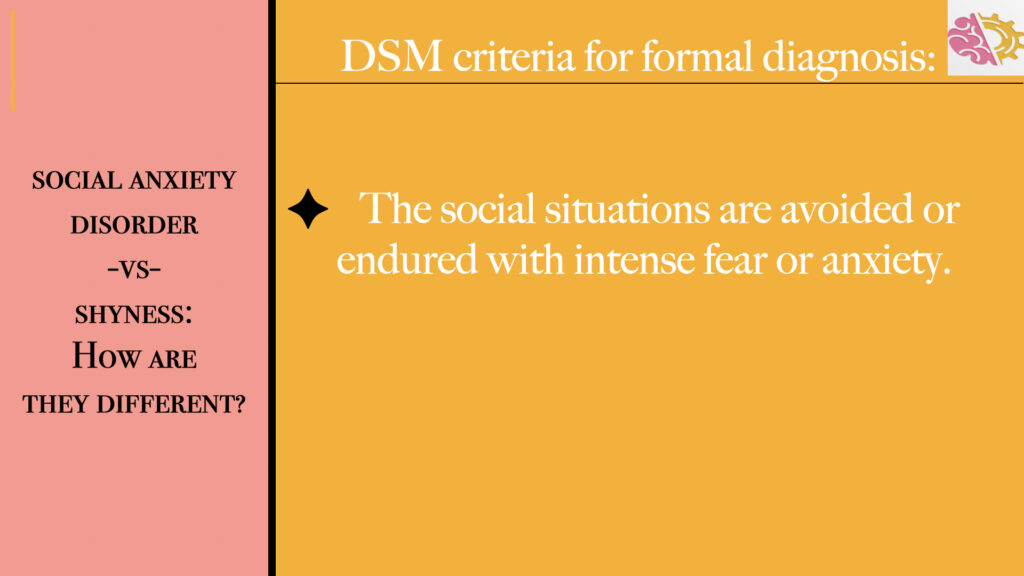
So we’re not just talking about an inconvenience, or choosing something else to do just because it’s not that important,
What we’re saying is:
Great extremes will be taken in order to avoid or minimize these types of feared interactions.
Someone will go to great lengths to isolate or avoid or evade the necessity to be in an uncomfortable anticipated situation.
And that will obviously create problems in life, because we can’t always avoid social situations, it’s part of being human and in order to make one’s way in life and hit your social milestones and your development and career milestones, and educational milestones, you have to find a way through the discomfort of change and uncertainty; what we want and need is almost always on the other side of fear.
Social interaction is unavoidable.
And it’s a healthy thing, because we are social beings.
We’re designed to be social.
And so social anxiety robs us of almost the privilege of engaging with our peers and being relatable, and relating to others, and growing with others and sharing experiences.
And so it’s a very devastating type of disorder, because it robs us of the privilege of participating in life in this shared human experience.
The next criteria states that the “fear, anxiety or avoidance causes clinically significant distress or impairment in social, occupational, or other important areas of functioning.”
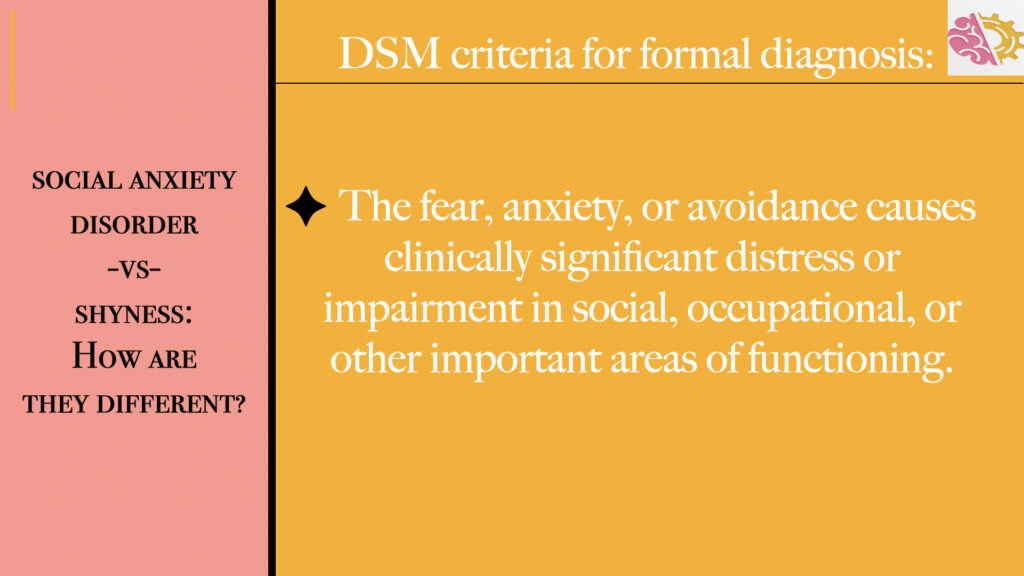
So going back to this notion of activities of daily living in mental health.
Clinicians will look for impairments.
One of these three areas (work, school and relationships) right? And if one of those are taking a big hit, that’s usually a big red flag that something is clinically not right in terms that something is not working, it doesn’t mean that we’re pathologizing the person, but it means that something is not working.
Something is getting in the way of this person making strides toward their goals and milestones; their growth and development, and we need to address it or it’s going to be very hard for that person to progress toward their goals and creating a life of meaning and purpose according to their own definition.
This next one is a big one, and it’s something I want you to remember whenever you’re looking at yourself and asking “Is this a problem for me?
We’re talking about duration.
The DSM says another criterion is whether the “fear anxiety or avoidance is persistent.”
And it’s typically lasting for six months or more, right?
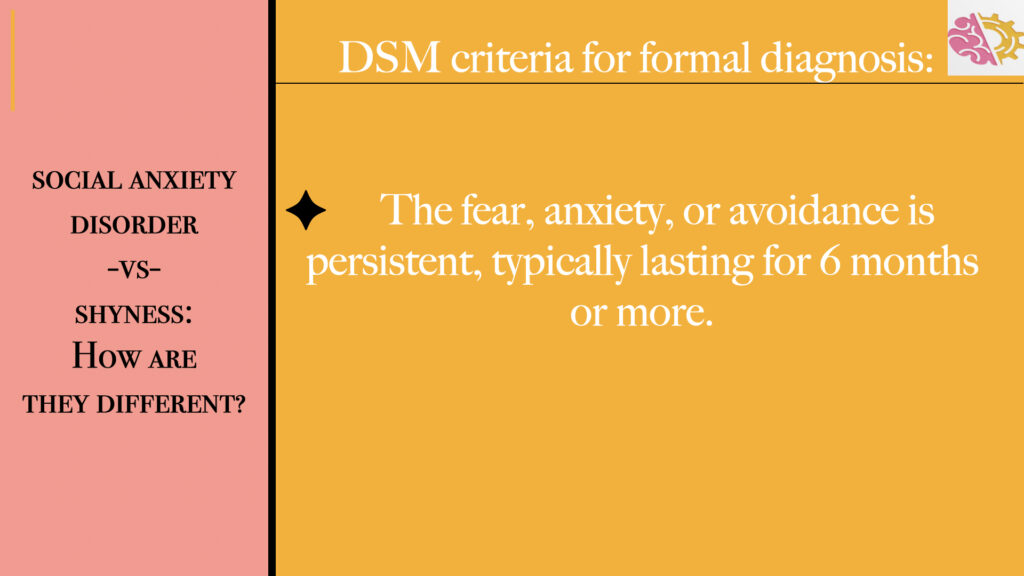
We need to give experience time right, we need to give ourselves time to wade through our emotions and go through the discomfort of change to know if our reactions are reasonable, according to the social norms you know and our development if that what we’re experiencing is a typical growth process or if we’re stuck, right?
And there’s a difference.
If we’re stuck and it’s, you know, generally lasting more than six months, and we can’t seem to get through at this developmental hurtle due to anxiety or depression or some other cognitive cognitive issues then It’s important to consider seeking help, right?
Because if we’re not able to get ourselves unstuck, it’s probably time to ask for help.
Otherwise, we might just be looking at an adjustment period right?
And everybody has to deal with periods of adjustment.
New job, new relationships, change, life transitions, grief and loss.
Life is full of change.
Change is a constant.
But with any big change, even milestones, even good change, it’s really, really, really important that we give ourselves like six months to a year to really adjust and get our bearings and go through the emotions and motions of life.
Just keep that in mind.
This next criterion is important to consider because we don’t want to necessarily pathologize something that is really a product of another problem, right?
We want to make sure that we’re looking at the whole picture here.
The DSM says that “the fear, anxiety or avoidance is not attributable to the physiological effects of a substance such as drug abuse or a medication or another medical condition.”
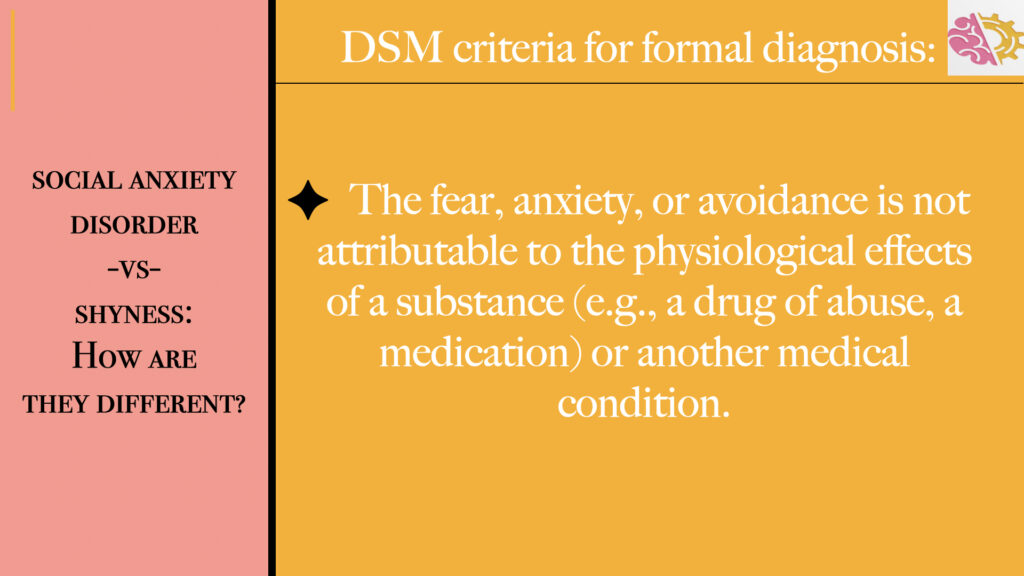
So then it’s important to consider the fact that if somebody has a co-occurring issue or problem, such as substance abuse, and they’re struggling with dependence or abuse of a mood altering substance like methamphetamine or other drugs or alcohol, that alone could muddy the water in terms of a gaining a clear picture of their mental health, and it’s important to make sure that we are cleaning the slate and getting the right treatment to address that identifiable problem, be it substance abuse or otherwise before we can start labeling a mental health diagnosis like social anxiety.
So we want to make sure that we’re not getting our wires crossed or jumping the gun.
In that regard, it also mentioned medical conditions, right?
And that could be a number of things.
I could be a physical ailment that causes one to be self-conscious.
It could be obesity, it could be things that create inconvenience and social situations that make it hard to adapt to social norms, and so can create it’s own kind of anxiety and fear of judgment by general others, and that doesn’t mean it’s irrational.
That would be a very rational fear, especially if that person has been subject to fear and ridicule because of those issues.
This next one goes back to what we were mentioning earlier, which is to make sure that we’re looking at the right type of anxiety.
The DSM says the “fear, anxiety or avoidance is not better explained by the symptoms of another mental disorder such as panic disorder, body dysmorphic disorder, or an autism spectrum disorder.”
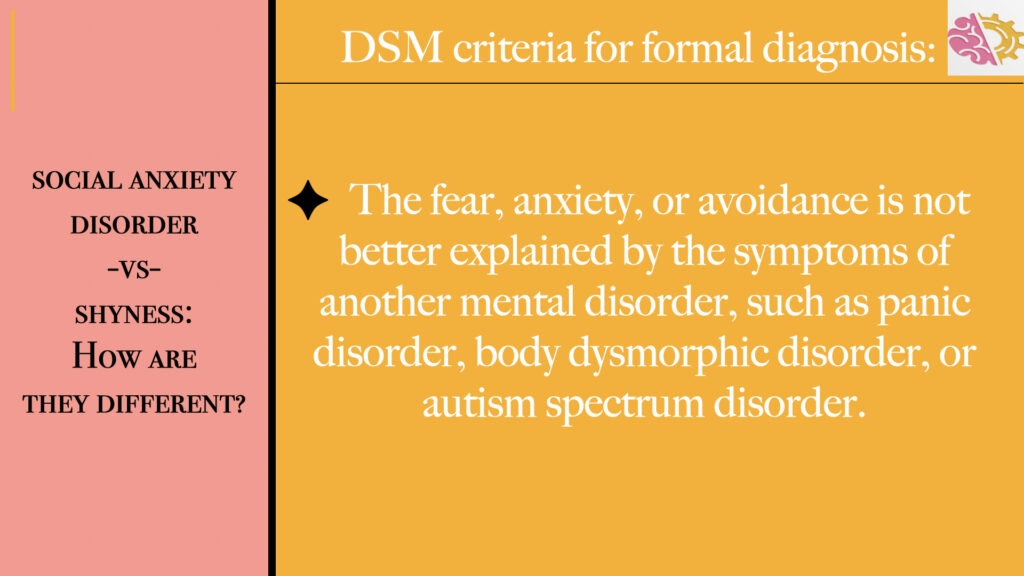
This is really important because we want to make sure that we are being tried and true with what we’re looking at, and we’re not skating past something else that makes more sense, right?
Panic disorder, for example, is generally the fear of panic attacks, that creates panic attacks, but has a different flavor to it and a different context than social anxiety disorder, right?
And that’s all we’re talking about here.
It’s just making sure that we’re considering the differential diagnosis and other options that can come along with that.
Sometimes they look very similar until we look at the nuances of what’s going on, and sometimes there’s the exception to the rule.
So this next criterion talks a little bit about that.
It says if “another medical condition such as Parkinson’s disease, obesity, disfigurement from burns, or an injury is present, the fear then the anxiety or avoidance is clearly unrelated or is excessive.”
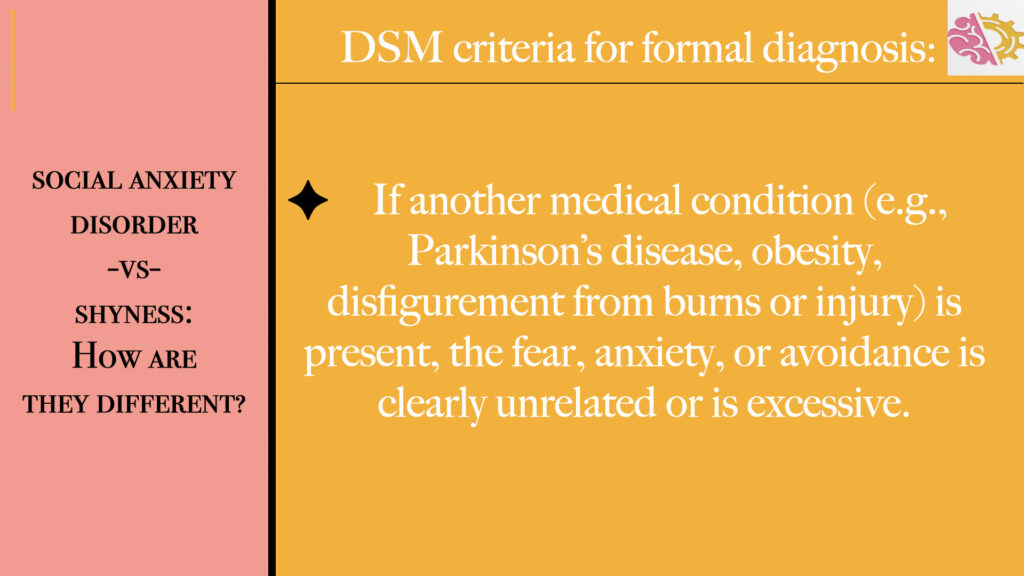
Meaning that that person has either made peace with their disability or has learned to function in spite of their disability and the social anxiety they do have is not related to that, or that the people who know them the best would say “Oh no that person? Yeah, they they’ve had burn scars. Their whole life they’ve been to therapy for that, or they’ve been to the burn camps and they’ve processed it and they’ve that’s not the problem.”
This social anxiety thing is different or it’s new.
Or it’s in in such an extreme that it’s even not explainable by that other condition.
And that can be a little tricky, and oftentimes one will have to consult with collateral-contacts, family, friends, in order to get the kind of the full scope or picture of what’s going on there.
And there’s one other little caveat when we’re looking at the criterion here, and that is.
That “if the fear is restricted to speaking or performing in public”; that’s not to say it’s not a social anxiety.
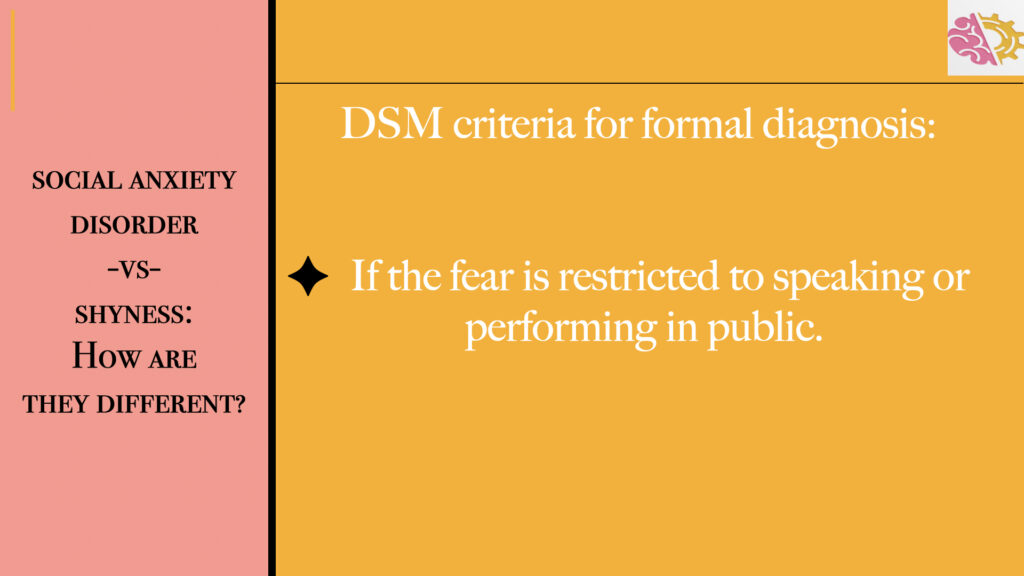
It’s just a very specific type of social anxiety, and the DSM does make an exception for that that this would be more of a performance social anxiety, right?
Okay, moving on.
So that’s social anxiety.
Shyness
So let’s look at the other spectrum here and look at shyness and some connotations and ideas about what shyness is as opposed to jumping straight to social anxiety.
When I think of shyness or being timid, I think of this as a personality trait.
That’s not necessarily accompanied by or with negative emotions or connotations, as though there is some pathology to it, right?
And that’s really the difference here.
Is that shyness is a personality trait.
Social anxiety is an impairment.
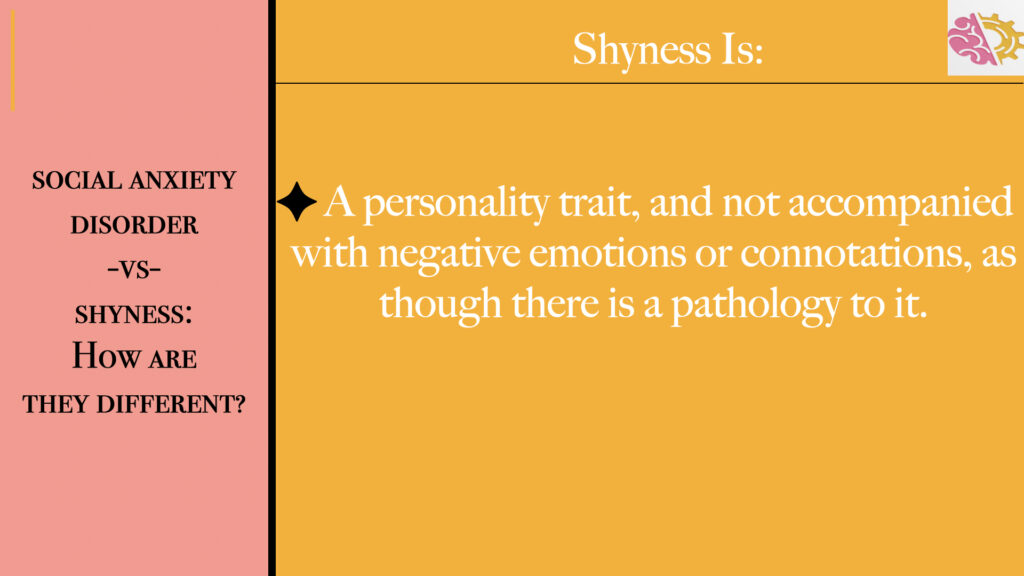
I want you to be really clear about that, Okay?
And by that I mean.
Shyness does not interfere with those activities of daily living. We talked about the occupational, academic or social aspects of one’s life.
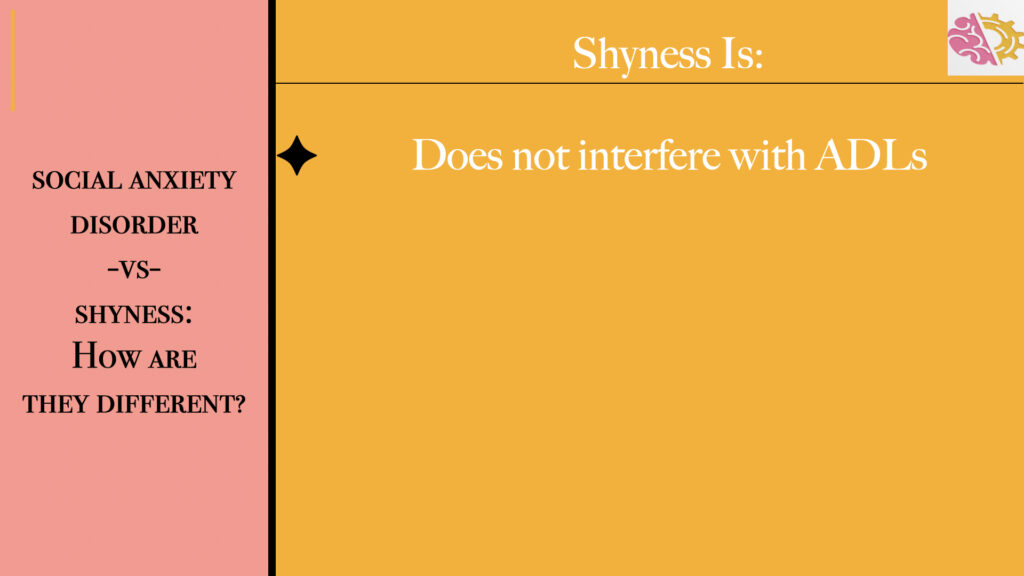
And think of it like this: Shyness is oftentimes front loaded, meaning that one might have a timid or shy personality, but once they break the ice or they acclimate to the environment and they get their bearings, then they’re able to engage more.
They’re not as self-conscious.
They are more confident in their role.
It doesn’t mean they’re going to be like the outgoing life of the party, but it means that they drop their guard.
They feel more comfortable in their own skin after they’ve got their feet wet a little bit into a new experience or routine.
That being said, shyness and general is manageable and it lessens with exposure. The more exposure, the less shy or timid one would seem, it doesn’t mean they’re not timid or shy or self-conscious.
It just means they are less bothered or it’s less apparent to others as they get more exposure.
When I think of this this notion, I think of my own experience.
Having worked at Denny’s right through college, I worked the graveyard shift and I was a waiter, and the interesting thing is I myself was very shy and timid going into that world.
Being a young adult, and having kind of a unorthodox childhood.
I didn’t have a whole lot of social exposure in the normal context, and when I joined the workforce at 18 y/o. I started as a kitchen scrub and then as I moved into a waiter position, I was a little worried about where they think about me.
How was going to be judged by my peers.
It didn’t take long, however, before I hit the ground running.
I went from host to waiter in a matter of weeks and then I was very comfortable and very excited to go to work and I saw the same thing happened with a lot of my peers that would come on, but every once in awhile in particular, I would see a coworker come on board who was extremely shy and sure enough though, after six-eight months of working as a hostess or a host or a waiter, that I saw that person develop into a more confident character just through the lived experience of being in a job where they had forced people-interactions or part of a team that had very set roles and expectations and routine.
And it wasn’t long before they were very comfortable and became more outgoing.
Does that mean again that they were the life of the team and they were the charismatic ones? No, but there was a definite difference in their presentation as they got comfortable with the people and the the job and their role, which makes sense.
Shy Introverts vs Extroverts
Now, because shyness is a personality trait, it’s important to think about it in terms of just a trait.
People can still be introverts or even extroverts and be shy or timid.
Shy introvert may prefer to still kind of be a homebody.
By themselves, mostly or a very small social circle.
A shy or timid extrovert may not necessarily want to be a homebody.
Once they get familiar with their group of people and they feel comfortable, become much more lively, right?
Or they might be very outgoing with a handful of people and they just like their world or their bubble to stay contained, and it doesn’t necessarily mean that they’re shy all the time, or that they’re one can’t be an extrovert just because they’re shy, and that’s a very important distinction to make.
Questions for Discerning Between Social Anxiety and Shyness
Alright, so when you are trying to discern whether or not you are personally struggling with a social anxiety or just shyness or timid personality, I would have you ask yourself if this is your anxiety.
Is your anxiety Preventing you from doing what you want to be doing and what you enjoy?
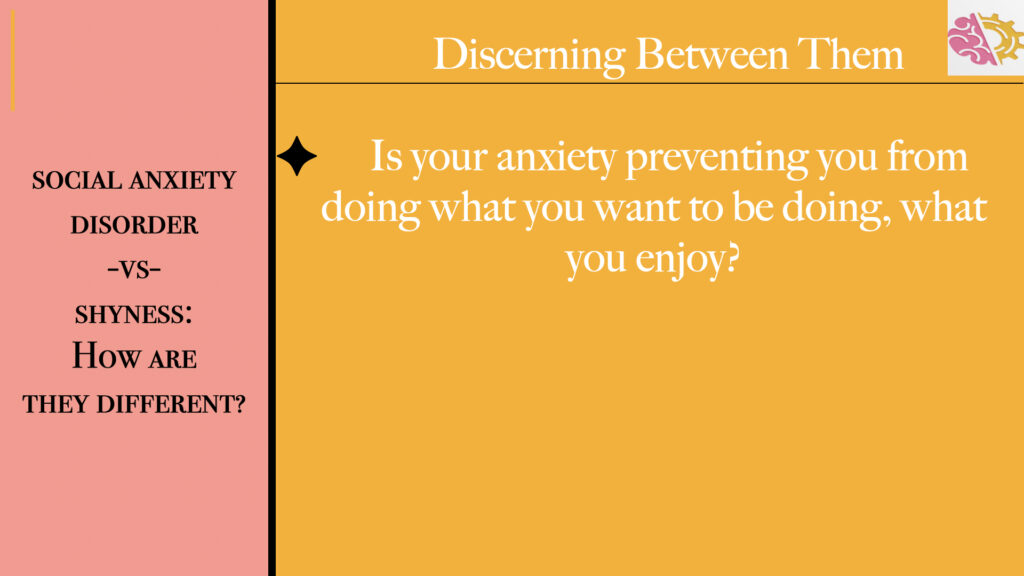
That is key.
Because if somebody is shy and timid or an introvert, chances are, they actually prefer that lifestyle.
If you have social anxiety and you want to be doing more, but you can’t because you get too worked-up.
That’s your indication that maybe you need to take a closer look and maybe seek help just in case.
And you also want to be asking yourself is your anxiety or shyness interfering with progress toward your goals, right?
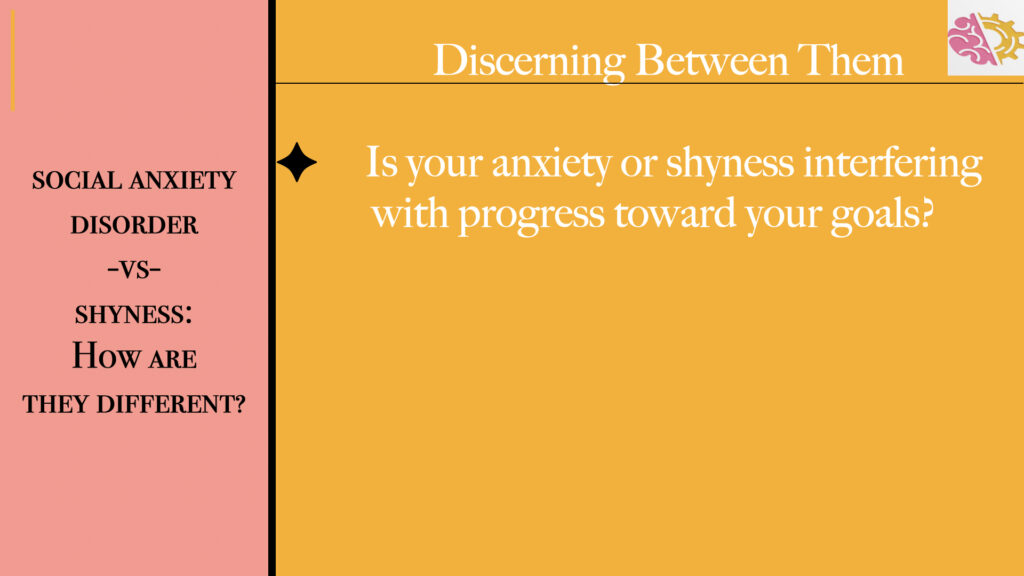
Not just living the life you want, but is your progress halted?
Or do you feel stuck?
That’s another big red flag.
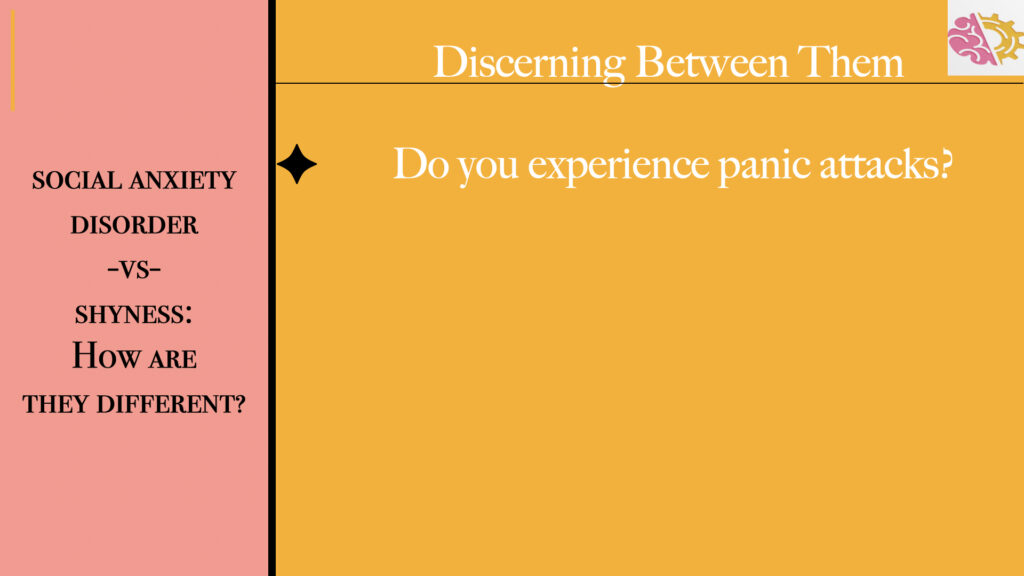
You should be asking yourself “do I have panic attacks?” Because that’s a pretty obvious red flag, and if you don’t know what a panic attack is, It’s very very very uncomfortable for some that can feel like a heart attack. Usually your heart’s pounding call that heart palpitations, shortness of breath, very shallow breathing. Some people feel very numb or even detached, sometimes referred to as depersonalization or derealization. It might get very cold or very hot or get dizzy.
Those are some examples of what can come along with a panic attack, and that’s a very strong fear-based reaction that your body is going into as a means of survival because it feels threatened and that’s a big red flag for anxiety in general.
And should be looked at more closely.
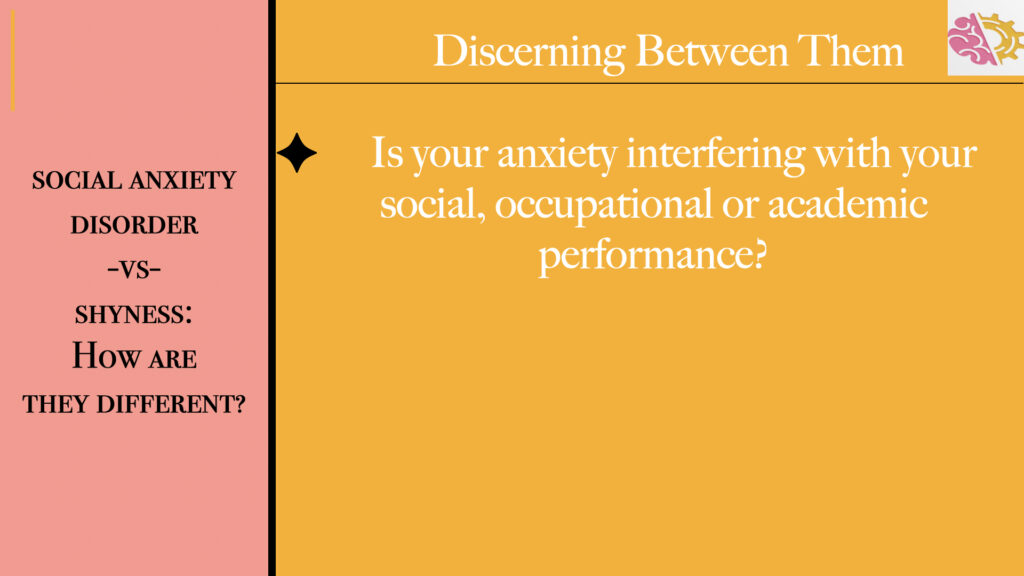
We talked about impairments in ADLs, just remember that if you’re ever wondering if you have a social anxiety, ask yourself: “Is it interfering with my job performance, my school performance, or my relationships on any significant level?
Recovering From Social Anxiety
Alright and if you have concluded that maybe you struggle with a social anxiety or anxiety disorder, what are some things you can do to help recover or address that right?
So let’s touch on that for a second.
First, of which the first thing comes to mind would be cognitive behavioral therapy counseling right?
Because we know that anxiety is fear based and so some time would be spent looking at your thought process and your assumptions and your rules and what’s contributing.
To that anxiety response, right?
So that’s best addressed in therapy or counseling.
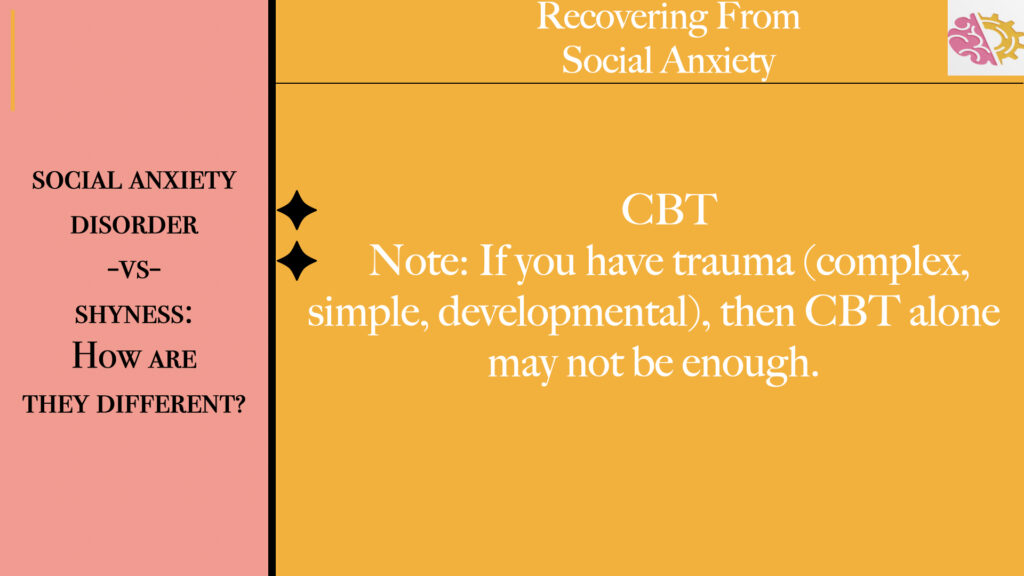
It’s also important to note, though, that if you have a history of trauma, be that complex trauma, simple trauma, developmental trauma.
That CBT alone is probably not enough that some trauma work will need to be done in order to kind of dive a little bit deeper than just what CBT can touch on in order to kind of figure out where that’s coming from.
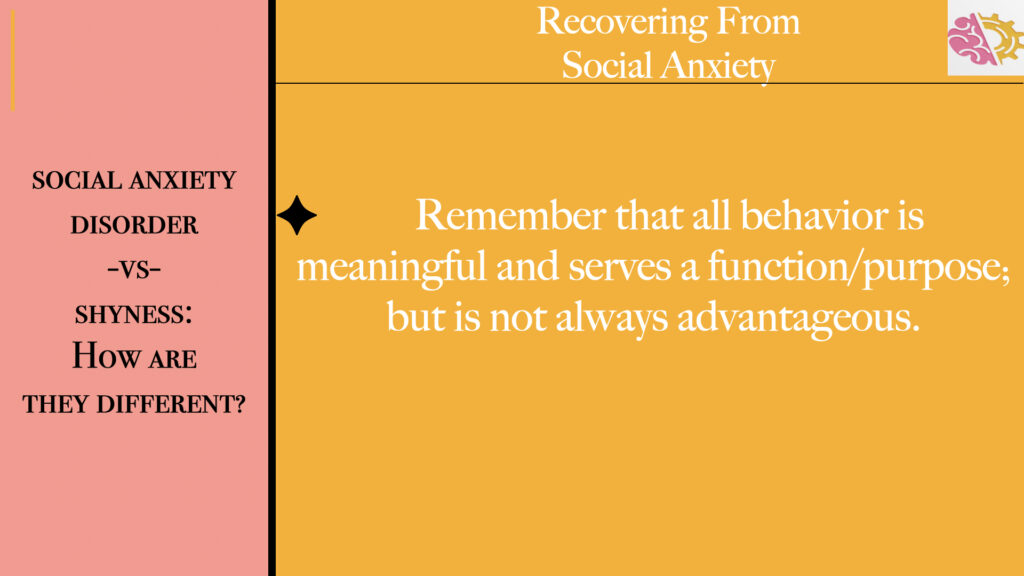
In recovering from a social anxiety or anxiety in general, I would have you remember that.
All behavior is meaningful and functional and serves a purpose of some sort, be it that purpose is to protect you, right? It may not always be advantageous, but it is your body or mind’s way of trying to keep you safe, and so it’s important to not get too down on yourself or shame yourself or feel bad or guilty, or that something is wrong with you. It’s really just your body’s attempt at protecting you and it’s important than, to have self-compassion, self-love and create some space for looking at that, but not from a self-shaming type of way, when it comes to anxiety or anxiety disorders.
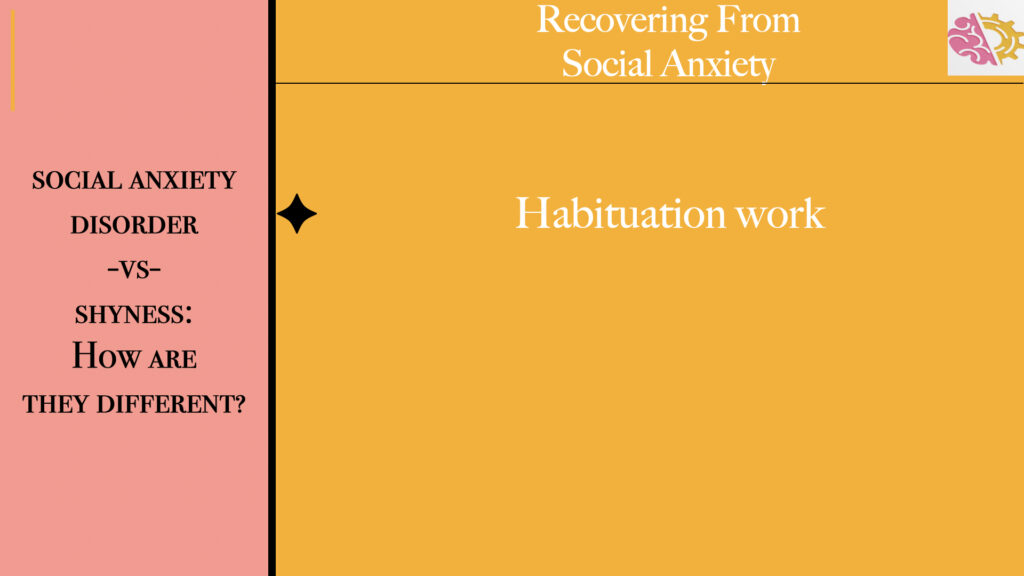
Oftentimes habituation work is a strategy or intervention that a counselor will use in order to minimize the anxiety response.
And so, if you have a counselor, maybe talk about habituation work as something to add to your agenda and coping skill and toolbox in order to better cope with your anxiety.
Habituation work is basically exposure therapy, but on very incremental steps and so that basically the the idea is that you’re increasing your distress tolerance little by little and not biting off more than you can chew, and not staying stuck.
So it’s kind of a a baby step plan and it’s very effective in increase distress tolerance. Maybe take a look at that if you are struggling with an anxiety disorder; since we’re on the subject, if you do feel like you would like to find a therapist but you don’t know how, be sure that you’re familiar with the process of finding a therapist.
Because one of my biggest pet peeves with managed care system is that it’s not always easy to access care when you’re ready, right?
If somebody is ready to ask for help and then it takes them months and months to get in somewhere, they don’t know where to start.
And then they don’t know how to leverage their insurance etc.
It can be very overwhelming and that person will oftentimes give up before they even start to work on their anxiety.
So familiarize yourself with the process.
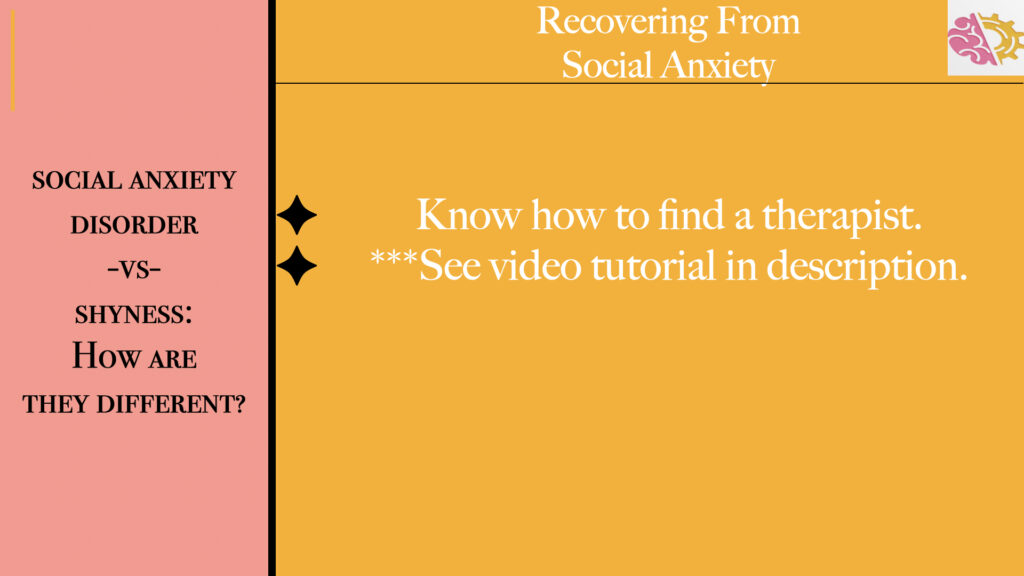
if you decide you want to find a therapist, or a coach or whatever works for you, I put together a tutorial for that specific purpose. You can check it out HERE.
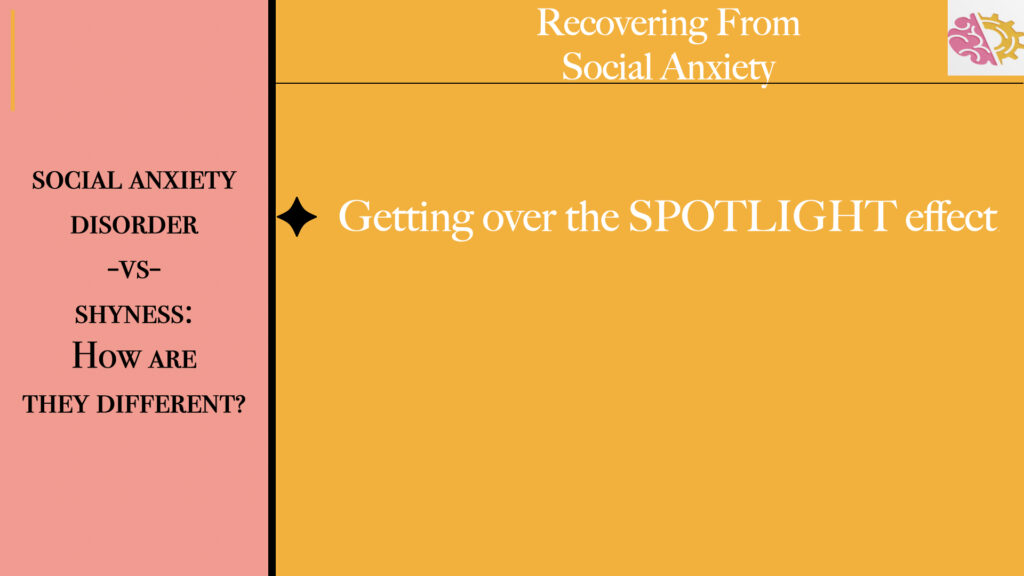
Alright, another method for recovering from social anxiety is learning to get over these spotlight effect spotlight. The Spotlight effect is akin to that feeling you assume that when you walk into a room and everybody’s eyes are on you, and that they are judging you, when in the reality most people are way too egocentric to be even giving you more than 8 seconds of their mental energy.
And I’m not being mean about that.
I just mean that most people are self-centered by nature.
We all are.
We are all concerned with our own thoughts and what other people are thinking of us.
We’re really generally not spending a whole lot of mental energy judging other people, and so that’s a good thing for you and me.
If you have social anxiety, try to remember that.
When you think somebody is thinking about you, they’re probably not, and so if you want somebody’s attention, you generally really have to work for it, okay, so that should be some kind of relief.
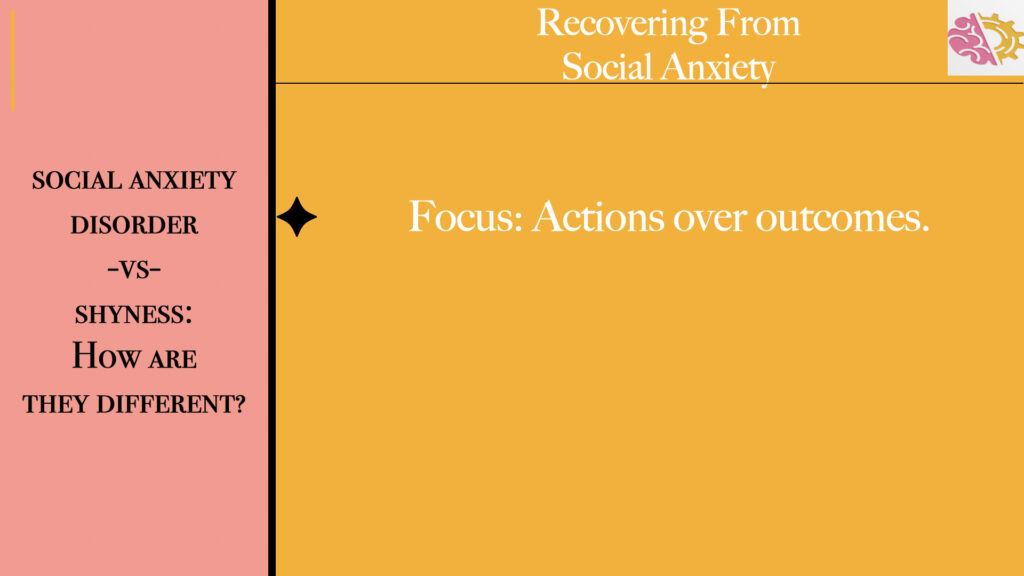
OK alright just a couple more things on this subject of recovering from social anxiety that I would have you focus on your actions and not outcomes.
Focus on what you have control over because with anxiety it’s very easy to get attached to outcomes and married to the idea of what “it should be” as opposed to what we have control over, right?
James Clear is author on behavior and behavior modification.
I really like his book and he talks a lot about this in his book Atomic Habits (amazon affiliate link).
So if you haven’t checked it out, it’s a good one to read on this subject of one’s thought process and what is advantageous for you to focus on versus not, and how to minimize anxiety in that regard.
Really helpful stuff.
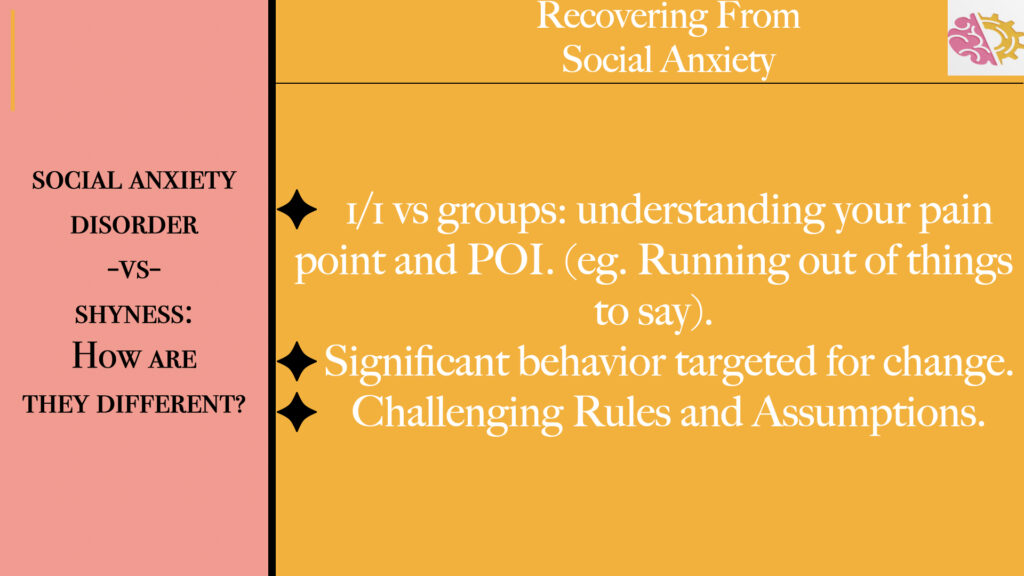
Alright, one last thought here and talking about general skills for recovering from anxiety is to think about whether you struggle more in one to one versus group settings, and in particular.
What kind of pain point are you struggling with in terms of the context, and if you can identify that, that’ll give you a point of intervention to work with.
For example, if you struggle with anxiety when you run out of things to say in a social context, that is something you can work on specifically that’ll help you feel more confident moving forward that you can practice and practice and practice and then just be mindful of when other things come up to take note of that.
When you see specific cues or triggers to your anxiety in social context.
This is important because when you have significant behavior identified, you can target that behavior for a change right toward a more positive outcome.
This goes back to what I was saying a minute ago about the difference between actions and outcomes.
If you’re focusing on what you have control over such as your personal reactions to things, or how you engage or respond to other people, then you’re going to feel empowered and you’ll understand that life is more malleable than maybe you’re giving it credit for, and this goes hand in hand with learning to challenge your rules and assumptions.
Various CBT type stuff.
Again you can work with a counselor or coach on that.
Hope that was helpful.
Questions
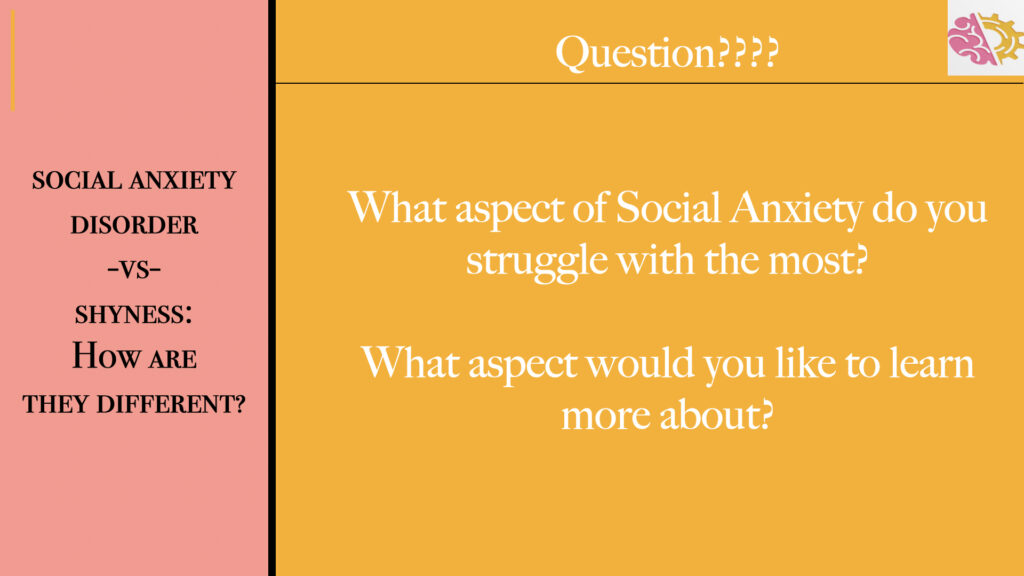
Alright so here’s my question for you, what aspect of social anxiety do you struggle with the most?
And what aspect would you like to learn more about?
So be sure to let me know if you have any requests for topics or other questions.
Q&A: Feel free to use the contact me form or the speak pipe link for Q&A comments, questions, and I’ll be sure to add that to my contact calendar.
And hopefully add more value to you.
Interpersonal effectiveness happens to be a passion of mine.
It’s probably one of my favorite subjects in mental health and personal development, and if you would like to learn more about social anxiety, I’m actually working on a mini course right now on the very subject.
If you want to know when that comes out and when it’s available, be sure to, if you haven’t already subscribe to the MHT Newsletter.
If you’re into self help books and self paced type programs, you’ll probably like this book on anxiety.
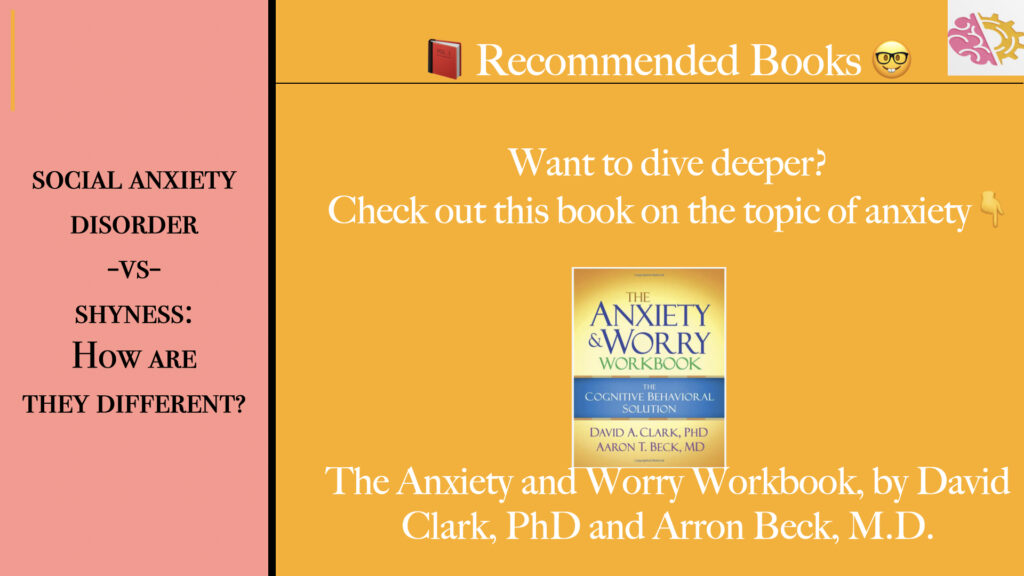
The anxiety and worry workbook by Doctor Beck and David Clark (Amazon affiliate link)
It’s a really nice self-paced handbook on coping skills for anxiety and based on CBT principles.
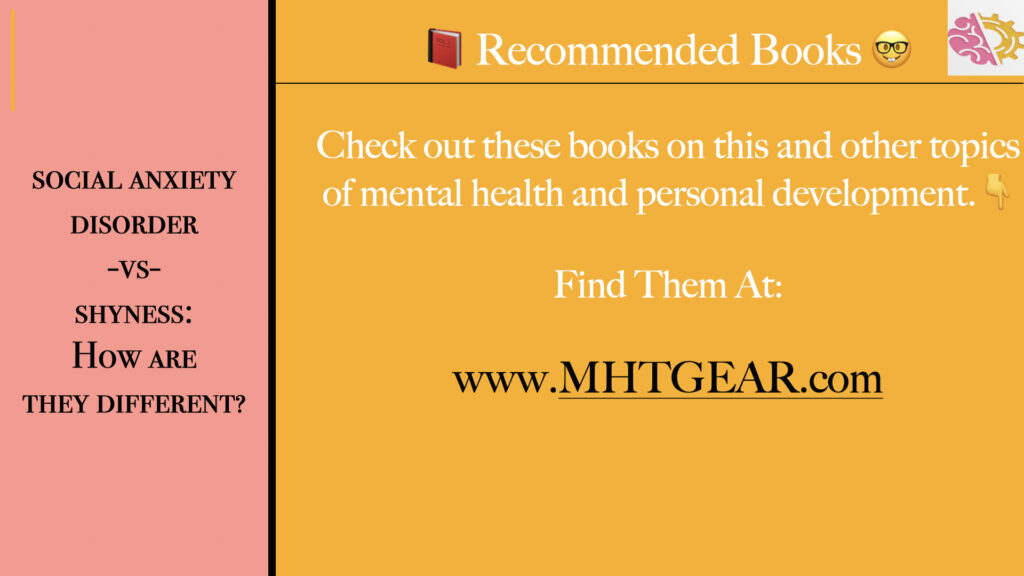
If you want to find other books on mental health and personal development, I’ve curated some of my favorites on one list, over at www.mhtgear.com. Feel free to check that out. Those are affiliate links and purchases made.Earn a small Commission fee that helps support this channel at no additional cost to you.
Alright, there you have it.
Another tool for you to thrive!
Be sure to subscribe like and share this content and that way it will reach more people and raise mental health awareness until next time.
Now go make good things happen.
Bye, bye.
Want to learn more? Check out my top picks for books on self-improvement and recovery HERE!
Want to see my full video playlist on skills for coping with Anxiety? CLICK HERE
NEED CRISIS HELP? If you need immediate crisis help with your depression, you can call the National Suicide Prevention Lifeline at 1-800-273-8255 or text “START” to 741-741
OUTSIDE THE UNITED STATES: See International Suicide Hotlines
WHERE TO FIND MENTAL HEALTH HELP:
-NAMI Referral Helpline: 1-800-950-6264
-California’s Statewide Mental Health Helpline: 1-855-845-7415
ASK: If you have a question you’d like me to answer here on the blog (even if you think it’s a silly one!), please use the form on the CONTACT ME page, or the comment section below. I would be happy to take a poke at it and provide a long form answer when appropriate.
SHARE: Also, be sure to share it with a friend, as there is still a lot of work to be done in raising mental health awareness.
SUBSCRIBE to get your FREE MOOD TRACKING TOOL and quick Mental Health Hacks in addition to this newsletter. Sign-up with the form below.
admin
Latest posts by admin (see all)
- Thriving with Autism and ADHD: Expert Strategies for Managing Burnout - April 22, 2024
- Serial Killer Spotlight: Dr. Caparelli’s True Crime Analysis - April 14, 2024
- Donna’s Law: Stop Gun Suicides - March 22, 2024


